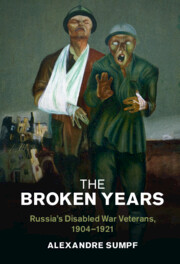
-
Select format
-
- Publisher:
- Cambridge University Press
- Publication date:
- 10 February 2022
- 17 February 2022
- ISBN:
- 9781009047296
- 9781316517741
- 9781009048385
- Dimensions:
- (229 x 152 mm)
- Weight & Pages:
- 0.61kg, 322 Pages
- Dimensions:
- (229 x 152 mm)
- Weight & Pages:
- 0.48kg, 322 Pages
You may already have access via personal or institutional login
Book description
The Broken Years tells the forgotten story of Russia's disabled ex-servicemen through three wars and three revolutions: the Russo-Japanese War, the Russian Civil War and the First World War. Using extensive archival material from national, regional and town archives, Alexandre Sumpf explores the treatment of these veterans by the state, their battle for legal status and their right to both collective and individual health care. He shows how the question of disabled veterans became bound up in broader political and social debates in the early 20th century and fostered healthcare and social welfare policy. The experience of these 1.14 million war veterans reconfigured notions of heroism, sacrifice and patriotism while the period of 1915-1919 was marked by extensive political activism by disabled veterans. Dr Sumpf illustrates how the Bolsheviks condemned disabled veterans as the symbol of the “imperialist war” and brutally negated their rights as part of the broader devaluation of the war experience in early Soviet Russia.
Awards
Honorable Mention, 2023 Disability History Association Outstanding Publication Award, H-Disability
Reviews
‘A heart-breaking study of forgotten fighters for Russia in the early twentieth century and a tribute to the vibrant activism of medical experts, social organizers, state officials, and wounded veterans. Their efforts created rights for the disabled, even as soldiers' sacrifices in world war one dropped out of Soviet sight.'
Jane Burbank - New York University
‘Meticulously researched, eloquent and moving, Alexandre Sumpf's important book brings disabled veterans, their sufferings, their emerging rights, previously overlooked or misunderstood, back to their proper place, at the heart of Russia's war experience in the early twentieth century.'
Bruno Cabanes - The Ohio State University
‘Sumpf shows how Russia's disabled veterans of the Great War found a voice, culminating in the Revolution, but were ignored by the Bolsheviks. He puts their experience of war and disability into its international context while exploring the relationship between Russia's Great War and Revolution. A moving and important study.'
John Horne - Trinity College Dublin
‘The Broken Years brilliantly excavates the lost voices of Russia's disabled veterans, long suppressed by both Tsarist and Bolshevik policymakers. Sumpf persuasively argues that disabled veterans of the First World War fought to amplify their voices as citizens through organizations such as the Union of Maimed Soldiers, but that the early Soviet state discriminated against them, crushed their movement, and relegated them to poverty.'
Karen Petrone - University of Kentucky
‘Sumpf’s study brings together a large body of material from Russian archives that would be inaccessible to most scholars due to language barriers as well as politics. This is one of the great contributions of his work … This book is also valuable as part of a comparative study on how nations interact with wounded soldiers.’
John Casey Source: H-Disability
‘The monograph will … hold considerable value for students of European history interested in the comparative experiences of war, disability, and veterans’ reintegration into postwar life. … Highly recommended.’
S. G. Jug Source: Choice
‘The Broken Years is an important book and a fascinating read for scholars of revolutionary Russia. Sumpf convincingly demonstrates that disabled veterans were a distinctive social group whose common struggle for recognition of their sacrifice offers fresh insight into the political and social history of revolutionary Russia. Sumpf’s meticulous efforts to move Russia’s disabled veterans to their rightful place in the broader international history of war and its aftermath will undoubtedly inspire future studies.’
Siobhán Hearne Source: H/Soz/Kult
‘Alexandre Sumpf’s outstanding study of disabled veterans in the Russian Empire across three early twentieth century wars offers a fresh look at the soldier in Russian and Soviet history. … The Broken Years is a masterful achievement and should find wide readership among those interested in military history, late Tsarist social history, and disability history. It will serve as a definitive study for years to come while also providing avenues for further research on veteran assistance, disability, and the push-pull between dominant and marginalized populations in Russia.’
Erica L. Fraser Source: The Russian Review
‘Sumpf has written a meticulous and moving study of disabled veterans that makes important interventions in a woefully understudied area … This book is therefore long overdue. Its great contribution is to make clear that disabled veterans were central to a whole host of major developments in the revolutionary period, from ideas of rights and charity to the rise of modern medicine, the welfare state and civil society.’
Thomas C. Stevens Source: Revolutionary Russia
‘The book … is based on a dizzying array of sources. … The writing, informed by a melancholy appropriate to the topic, is beautiful and often evocative. … this path-breaking study … is highly recommended for every serious student of Russian and Soviet history as well as the history of veterans and of disability more globally.’
Mark Edele Source: Slavonic and East European Review
Contents
Metrics
Altmetric attention score
Full text views
Full text views help Loading metrics...
Loading metrics...
* Views captured on Cambridge Core between #date#. This data will be updated every 24 hours.
Usage data cannot currently be displayed.
Accessibility standard: Unknown
Why this information is here
This section outlines the accessibility features of this content - including support for screen readers, full keyboard navigation and high-contrast display options. This may not be relevant for you.
Accessibility Information
Accessibility compliance for the PDF of this book is currently unknown and may be updated in the future.


